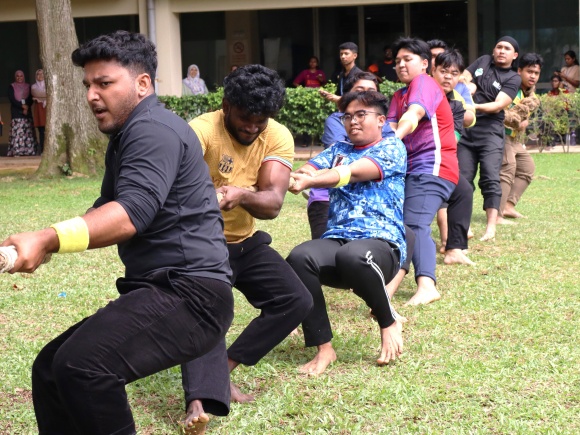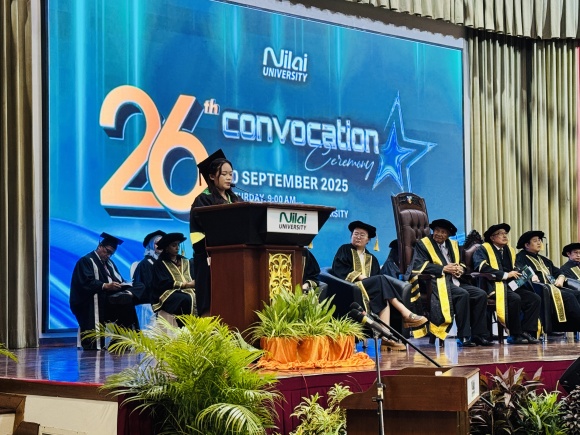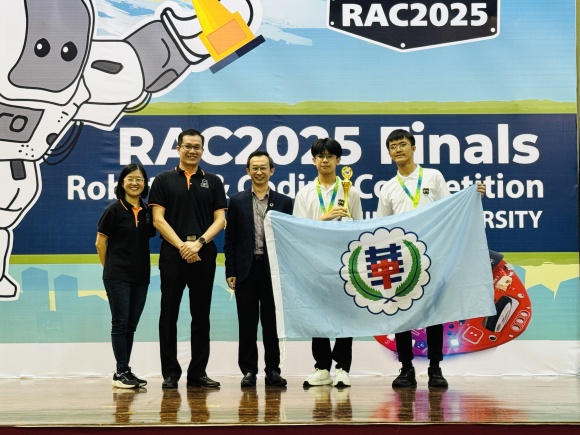.jpg)
Nilai UC Vice President Dato' Dr Sothi Rachagan presenting Dr Moni Lai Storz with a memento.
"How do you approach a person from another culture? In a cross cultural encounter, whose culture should we choose?" asked Dr Moni Lai Storz. Dr Moni was at Nilai University College (Nilai UC) as part of the institution's continuing series of Graduate@Today lectures that has distinguished speakers share their knowledge on a wide variety of subjects with students and staff alike.
The query she posed above was central to her talk entitled 'Learning and Teaching Across Cultures: Asians, Africans and Westerners'. Dr Moni said that this scenario was on the increase as export education continues to grow in Malaysia and other countries. She posits that with the current economic slowdown will pose further challenges for educators as students stay for longer periods instead of joining the workforce quickly.
Dr Moni also points out that teaching and learning is significantly influenced by psycho-cultural factors. In a multi-cultural classroom, lecturers cannot afford to ignore these and this is especially true in the case of Nilai UC where 40% of its student population come from abroad. Thus Dr Storz was met with a large contingent of lecturers eager to find ways to communicate better with their international students.
To better manage such cross-cultural, Dr Moni recommends that lecturers utilize a 'KIT' (K for knowledge, I for Intercultural awareness and T for tools). Among the tools she suggested include ascertaining a person's belief system (for example she said when speaking to a Caucasian, you can assume that his value system will be Judea-Christian) as well as attitudes (such as his value systems, social norms, laws and etiquette). From that you can determine the person's business practices and his sense of ethics. For example, in certain cultures it is acceptable to accept gifts as part of business practice whilst it is frowned upon in others.

Dr Moni Lai Storz is the latest speaker in Nilai UC's Graduate@Today series of lectures
Dr Moni also shared a number of charts and diagrams detailing what are acceptable boundaries when establishing contact with a person from another culture. As an example, she said that while it is perfectly acceptable here to ask a person's race but it is considered rude in many cultures. Dr Moni then gave a few helpful tips on how to gain this information in a more subtle way. For example, she said you could ask a person what languages and dialect he or she spoke which would reflect a person's heritage and background.
She also states that Malaysians are better equipped than most to meet the demands of adapting to varying cultural standards due to the melting pot make up of its citizens. "Malaysia is a laboratory in cross-cultural relationships," she enthused.
Dr Moni is the founder and currently the Academic Director of the Australasian Centre of Chinese Studies and Executive Consultant to Global Business Strategies in Australia. She holds a doctoral degree from Monash University, Australia. Dr Moni pioneered programmes on cultural awareness and cross-cultural communication skills for people in the Export Development Programmes organized by Monash University's Centre for International Business on behalf of several state and federal bodies. In addition t being an academic and a trainer, Dr Moni writes fiction and poetry as a hobby. Her published works include novels, a collection of poems and a play to which she frowned that "writing doesn’t pay"!



